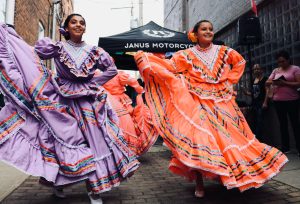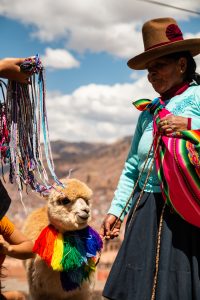Dig Deeper: Dolores Huerta

Photo from Tom Hilton on WikiMedia Commons
In her 93 years, Dolores Huerta, organizer and co-founder of the National Farm Workers Association (now United Farm Workers) with Cesar Chavez, made significant strides in fighting for the rights of farm workers, women, and Hispanic Americans.
Political activism and organizing were a part of Dolores Huerta’s life from an early age. It might seem that Huerta followed in her father’s footsteps, as he was a union organizer and briefly a New Mexico legislator. However, according to her biography page from the Dolores Huerta Foundation, Huerta credits her mother Alicia’s independent, hardworking character for sparking a similar determination in her.
Growing up in Stockton, Calif., a culturally and ethnically diverse agricultural city with a significant population of low-income farm workers, Huerta saw early-on the troubling conditions farm workers were subjected to, with which her mother empathized. Despite her position as a divorced mother of three in the ’30s and ’40s, Alicia was equal parts savvy businesswoman and caring community leader, making her hotel a safe haven for low-income farm workers.
According to the Dolores Huerta Foundation, Dolores was always an active student and community member, but her story as an organizer really begins with her work with the Stockton Community Service Organization (CSO), where she met her organizing partner Cesar Chavez. Bonding over their shared goal of unionizing farm workers, Huerta and Chavez co-founded the National Farm Workers Association (NFWA), the first U.S. labor union for farm workers, in 1962.

Photo from Susan Ruggles on WikiMedia Commons
Coming out of a time where gender roles and expectations were especially unyielding, during her work for the NFWA, Huerta strategically used her position as a Latina and as a divorced mother to her advantage. In her examination of the rhetoric of Dolores Huerta, Sowards reports instances of Huerta strategical bringing her children to (and breastfeeding at) negotiations and using tears and emotion to disrupt and subvert expectations in male-dominated spaces.
Perhaps her most significant contribution is her coining of “Sí, se puede,” which translates to “yes, we can,” according to Godoy’s NPR article about Huerta. What we now know as a famous Hispanic activist chant originated from Huerta’s rhetorical ingenuity and understanding of the importance of audience participation.
Huerta’s organizing branched out to the burgeoning feminist movement, even working with notable feminists like Gloria Steinem. She brought these issues to her work in the farm worker’s movement, challenging gender discrimination within the movement and in society as a whole.
Throughout her career, Dolores Huerta has continued to fight for the rights of marginalized people, including working-class women and Hispanic and Latine people. She has worked with countless organizations and causes, including the NFWA, National Boycott of California Table Grapes, Feminist Majority’s Feminization of Power: 50/50 by the Year 2000 Campaign, and 21st Century Party, to name a few. Even at the age of 93, with the Dolores Huerta Foundation, she continues to serve the community and work in activist spaces.
A decorated activist, Huerta’s accomplishments, which are perhaps too extensive to list in their entirety, include being award the Eleanor Roosevelt Humans Rights Award in 1988 and the Presidential Medal of Freedom under Obama, a noted admirer, in 2012.
Despite their work together, Cesar Chavez’s name tends to outshine Huerta’s in the public’s recollection. Yet, for her tireless dedication to organizing for marginalized people, Dolores Huerta deserves to be remembered, especially during Hispanic Heritage Month, as the compassionate, dedicated “Dragon Lady” she is.
Dig deeper and explore the links below for more on Dolores Huerta and her contributions.
Resources on Dolores Huerta at Falvey:
- Sowards article on Dolores Huerta’s rhetoric
- Dolores documentary
- Dolores Huerta: “Yes we can!” video from Untold: Hidden Figures
- Dolores Huerta: Advocate for Women and Workers
- Dolores Huerta: Voice for the Working Poor
- Dolores Huerta Stands Strong : The Woman Who Demanded Justice
- “The Blueprint: The Radical Solidarity of Dolores Huerta and Harry Belafonte” in Rebel Speak: A Justice Movement Mixtape
- Latina Legacies: Identity, Biography, and Community
Other resources on Huerta:
- “Dolores Huerta” biography page from the Dolores Huerta Foundation
- NPR article about Dolores Huerta and “Sí Se Puede”
- Dolores Huerta biography from the National Women’s History Museum
- Dolores Huerta’s TED Talk
- Good Morning America animated segment on Dolores Huerta
- ABC News Dolores Huerta interview segment
 Annie Stockmal is a second-year graduate student in the Communication Department and Graduate Assistant at Falvey Library.
Annie Stockmal is a second-year graduate student in the Communication Department and Graduate Assistant at Falvey Library.


